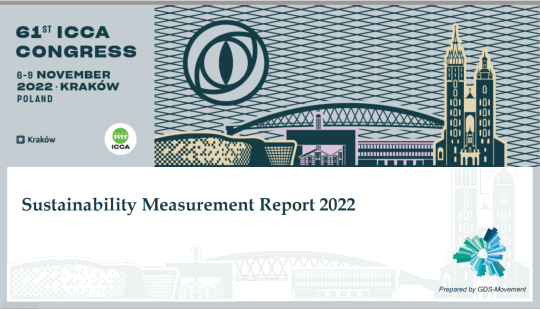ICCA congress in Krakow - Sustainability Measurement Report
The 61st annual ICCA Congress is the premier business event for all involved in the global association meetings industry. Each year, thousands of events professionals and association executives converge at a new host destination for the three-day programme. Attendees benefit from opportunities to make meaningful connections with new business partners, knowledge-sharing, and expert insights. ICCA Association, together with the GDS movement, summed up the congress in Krakow in 2022 in terms of organising sustainable events. The scope of this sustainability report covers in-person measure of the environmental footprint of the ICCA Congress event, following the ICCA Congress Sustainable Event Strategy. In cases where real-time data was not available, estimated data points were taken into consideration.
The total tCO2e carbon footprint of the event was t2079.35 (3053.38 kg CO2e per participant), a similar carbon footprint is generated by an average car for 2 years. The largest carbon footprint - almost 90% of the total - was generated by participants of the meeting. Additionally, a total of 26 tonnes of waste was generated.
In the summary of the report, activities that had a positive impact on the assessment of the congress in Krakow were appreciated. Among them, the following are noteworthy: the use of public transport by delegates, the reduction of plastic in the production of branding, including the use of electronic carriers at the ICE Kraków Congress Center or the production of congress badges from biodegradable paper. Reusable tableware was used during coffee breaks and lunches. Organisers encouraged participants to use water dispensers. Guests could try seasonal local fruit and sweets not packed in plastic. The congress space was equipped with bins for waste segregation and plants. A charity run was also organised. The income of the run was donated to the Polish Humanitarian Action. One third of the congress program concerned the subject of sustainable development.
The authors of the report also indicated areas that are worth working on: correctly estimating the demand for catering food to avoid throwing it away, using local products in the menu and in decorations (e.g. avoiding exotic flowers), as well as providing more detailed data on, for example, elements of congress organisation or food as well.
The full report is available here.
